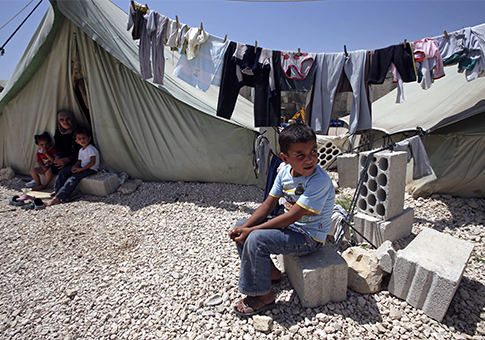Aid organizations and governments in the Levant region will make their largest-ever plea for humanitarian assistance in response to the spillover of hundreds of thousands of Syrian refugees fleeing a devastating civil war, regional experts said Tuesday.
The destabilizing Syrian conflict has generated about 1.7 million refugees, with more than 500,000 flooding into neighboring Lebanon, according to participants in a teleconference event at the Carnegie Endowment for International Peace.
Regional groups will ask the United Nations for a total of $5 billion in humanitarian aid by the end of this year, they said.
Ninette Kelley, a representative of the U.N. Refugee Agency in Lebanon, said Syrians who initially attempted to stick it out began to vacate their native country after fighting intensified in the towns of Homs, Aleppo, and al-Qusayr in recent months.
A string of victories by President Bashar al-Assad’s regime prompted President Barack Obama to pledge limited arms support to the Syrian rebels, but questions remain about whether Western arm shipments will be controlled by the moderate rebels or fall into the hands of radical Islamist groups also opposing Assad.
U.N. workers register 6,000 Syrian refugees a day and 15,000 a week in Lebanon, Kelley said. More than half of the 500,000 refugees are children, many of whom lack access to clean water, health care, and educational instruction.
She recounted one story of an 11-year-old Syrian refugee whose family left their original house for a suburb in the country after it was struck by a mortar. A barber shop the boy entered was also bombed, blinding him in one eye with a shard of glass.
"I wish I could tell you that’s a singular story, but it’s not," she said. "It’s happening all over the country."
The influx of Syrians into Lebanon, who now constitute a quarter of the country’s population, has also increased competition for jobs and lowered wages, said Lebanese Minister of Social Affairs Wael Abou Faour.
Unemployment recently rose to 10.6 percent, compared to 8 percent in 2010, he said.
The fact that more than 100,000 of the refugees reside with Lebanese families demonstrates the hospitality of the people there, who call them "neighbors" rather than refugees, Kelley said.
"It’s no exaggeration to say that there are many towns throughout Lebanon where there are more Syrians than Lebanese, and yet Lebanon has not closed its borders," she said.
Yet as the social and economic hardships of the Lebanese and Syrian refugees continue to mount, Lebanon will press for a solution to the two-year conflict that has claimed almost 100,000 lives, Faour said.
"Lebanon is not to become the comfortable option if you like," he said.
"We want to provide humanitarian assistance, but we don’t want to create a permanent home for the Syrian refugees."
